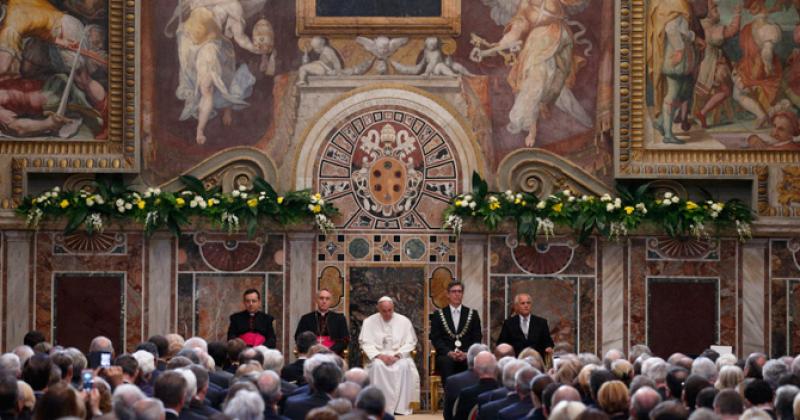It rarely happens that the head of the Catholic Church accepts an award. Yet, Pope Francis--as had been the case with St. John Paul II--has accepted the International Charlemagne Prize, one of the most important European awards that are usually given to the figures marked by playing a role for the sake of European values and unity. The prize is intended to shed light on some of the points he had highlighted at the European Parliament (on January 25, 2014) and at the United Nations (on September 25, 2015). In other words, the prize was not intended to “honour the Pope” in as much as it was intended to draw attention to what the Pope wants to say to the European countries.
Pope Francis focused on current pressing issues owing to the sounds of the knocking on the European doors by the universally displaced groups, especially those fleeing the Middle East. A few days later, he visited Greek Lesbos Island and took with him three families only, which triggered a huge debate among the ranks of the forcibly displaced.
The Argentinian Pope said that Europe today needs firstly integration, secondly dialogue, and thirdly generation. These principles complement his “forceful” views he expressed in the European Parliament when he referred to Europe as “an ageing grandmother suffering from weariness, which became infertile and lost its vitality, where it seems that sublime ideals that had inspired Europe have been dissipated. Europe is deteriorating, where it seems to have lost its generative creativity.” At the ceremony marking the reception of the award he answered worrying questions such as:” “What has happened to you, the Europe of humanism, the champion of human rights, democracy and freedom? He also drew a roadmap urging the continent, which plays a historic role in humanity, to give birth to new humanism based on three capacities.
First: The capacity to integrate. This can be brought about by attaining integration that transcends the geographic factor. He quoted a statement by the first German chancellor, Konrad Adenauer, who said: “The future of the West is not threatened by political tension, but rather by evading responsibilities and by being only ‘selfish’.”
Secondly: the capacity for dialogue. He focused on the need to adopt a culture of dialogue, not exclusion. He said that this should be included in all school curricula as a material representative of all the subjects that helps instill in the generations to come means to solve disputes by resorting to dialogue and encounter rather than resorting to armament.
Thirdly: the capacity to generate. When linking this capacity with the previous one, the need to involve all components of society in building an integrated and compatible society emerges. He also called for helping the youths get employed, not merely for being representatives of the future but rather for representing the present that leads to the attainment of dreams.
The Pope presented “a new dream” where he used the same terms which Martin Luther King had used in August, 28, 1963 “I have a dream’’, hoping to see “a new European humanization” with these three clues, mostly dialogue. He is the one who had met with His Royal Highness Prince El Hassan and the delegation of the Royal Institute of Interfaith Studies two days before receiving the award. During the meeting, he stressed that dialogue is the convergence of hearts before the hugs of words and the shaking of hands... all of which create inevitable dialogue of friendship in Europe, in our Middle East and in whole world. The final declaration of the colloquium in the Vatican of the Pontifical Council for Interreligious Dialogue and the Royal Institute for Inter-Faith Studies did not miss any reference to the “humanizing the role of religions” when their followers adopt the principles of the worship of God and the love of the neighbor.”
Let us share the dream of a new humanization of the world.
